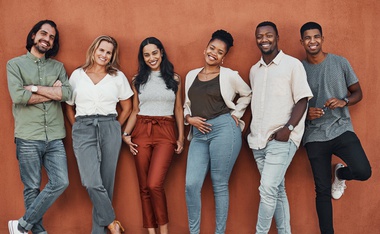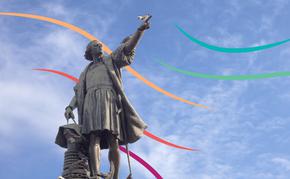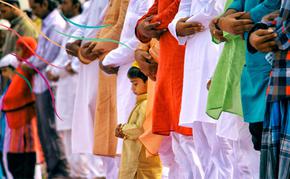The views expressed in our content reflect individual perspectives and do not represent the authoritative views of the Baha'i Faith.
“He really doesn’t seem like the type,” she said about the husband of one of the Baha’is, who was in the midst of deciding whether to become a Baha’i himself.
I thought about it, wondering exactly what she meant, and realizing that her assertion didn’t ring true with me.
RELATED: Am I a Baha’i?
In my experience there really wasn’t a particular type of person who became a Baha’i. Baha’is all follow the same teachings and principles, but do not all have the same opinions, personalities, or predilections.
The Baha’i Faith, I believe, is for everyone. Abdu’l-Baha said as much in this talk he gave in Paris:
Likewise, when you meet those whose opinions differ from your own, do not turn away your face from them. All are seeking truth, and there are many roads leading thereto. Truth has many aspects, but it remains always and forever one.
Do not allow difference of opinion, or diversity of thought to separate you from your fellowmen, or to be the cause of dispute, hatred and strife in your hearts.
Rather, search diligently for the truth and make all men your friends.
Every edifice is made of many different stones, yet each depends on the other to such an extent that if one were displaced the whole building would suffer; if one is faulty the structure is imperfect.
Baha’u’llah has drawn the circle of unity, He has made a design for the uniting of all the peoples, and for the gathering of them all under the shelter of the tent of universal unity. This is the work of the Divine Bounty, and we must all strive with heart and soul until we have the reality of unity in our midst, and as we work, so will strength be given unto us.
Throughout my adult life, I had met truly wonderful Baha’is from a variety of backgrounds and beliefs. But reflecting on my own experience, I realized that in each of the communities where I had lived, there were a few people who also felt as my friend did.
I was reared Lutheran and became a Baha’i in 1968 during my sophomore year in college. The Baha’is in the college community were all music and theatre arts majors. I was not. In fact, when I wanted to declare my belief in Baha’u’llah, the young woman with whom I spoke told me later that she had been hesitant to talk with me because she was afraid that I wanted to gossip about my ex-boyfriend, who had introduced me to the Faith and was now dating another girl!
When my family moved across the country a few months later, I transferred to a new university and I joined a sorority. Most of Baha’i youth at school were from a different subculture, and couldn’t believe that I could be a Baha’i and still be a part of “the establishment.”
That implied criticism made me wonder again if there was something wrong with me. But I realized that Baha’u’llah came to unify the entire world and that he came for everyone, not just the hippies and the arts majors. Those kids and I had a lot more in common than not. So, I decided that while I still had much to learn about my new Faith, I was okay.
A few months later at a sorority function I met and fell in love with a young fraternity man who later became my husband. My parents were so relieved – he was Presbyterian, not a Baha’i! Maybe, they thought, there was still hope for me. They didn’t know much about the Baha’i Faith and weren’t interested in hearing more. It wasn’t what they believed, so it had to be wrong. And the Baha’is? At a Baha’i club sponsored dance I overheard two chaperones discussing my pending nuptials.
“Did you hear that Barbara is getting married to a non-Baha’i?”
“Yes. And I just hate it when an active Baha’i girl marries a non-Baha’i. You just never see her again.”
A few years later I came across a book by B. Hoff Conow, The Baha’i Teachings. In chapter 6, “The Paradoxical Nature of the Unity of Opposites,” she discusses “The Positive/Negative Continuum” and illustrates how we move from a lower level of the expression of a quality or virtue to a higher level. Using the neutral quality “worthy,” she shows a continuum of various degrees ranging from “blameworthy” on one end, to “praiseworthy” on the other.
RELATED: Finding Your Spiritual Identity: A Story of Becoming a Baha’i
This understanding helped me to realize that each of us are at varying levels of expressing our inner spiritual attributes and virtues – and that both my parents and my fellow Baha’i youth were expressing the virtue of knowledge from different points of development. Like flowers in a garden, Abdu’l-Baha wrote in his Tablet to the Hague, we each have our own unique characteristics – and that diversity can create great beauty:
Consider the flowers of a garden: though differing in kind, colour, form and shape, yet, inasmuch as they are refreshed by the waters of one spring, revived by the breath of one wind, invigorated by the rays of one sun, this diversity increases their charm, and adds unto their beauty. Thus when that unifying force, the penetrating influence of the Word of God, takes effect, the difference of customs, manners, habits, ideas, opinions and dispositions embellishes the world of humanity, and this is praiseworthy. This diversity, this difference is like the naturally created dissimilarity and variety of the limbs and organs of the human body, for each one contributes to the beauty, efficiency and perfection of the whole. When these different limbs and organs come under the influence of man’s sovereign soul, and the soul’s power pervades the limbs and members, veins and arteries of the body, then difference reinforces harmony, diversity strengthens love, and multiplicity is the greatest factor for co-ordination.
Later, when our children were grown, my husband Steve and I volunteered our services at the Baha’i World Centre in Haifa, Israel, working with people from a variety of countries and cultural backgrounds. (At that point, my husband had become a Baha’i.) One afternoon we were invited to dinner at a neighbor’s home. She cooked and served a lovely meal, but something in her manner made me wonder if she felt trapped in a traditional female role. But I stopped before letting myself decide that I didn’t like her. Instead I gave her a chance, and as we got to know each other better I moved along the continuum from indifference to liking to loving her. We even vacationed together when our husbands couldn’t get away.
So, I think the secret to getting along with people whom we may initially have a negative, kneejerk reaction to is to give them a chance – which means that everyone is potentially that “type” of person.
















Comments
Sign in or create an account
Continue with Googleor